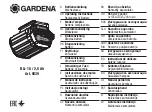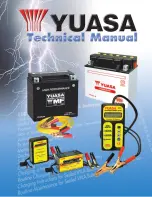
6
Table 1 below gives some examples of battery cable cross sections calculated with formula
(5).
(in this case I and V in formula (5) are the output current and output voltage of the charge
controller)
12V system (solar array up to 1000W)
Maximum
solar array
output
Maximum
Charge
current
@13,4V
Battery
Fuse
Rating
Power loss
in battery
cables
α (%)
Length 2x1,5 m
Length 2x2,5 m
Length 2x5 m
mm
2
AWG
mm
2
AWG
mm
2
AWG
500W
37A
63A
1
16
5
25
3
Not recommended
750W
55A
80A
1,5
16
5
25
3
Not recommended
1000W
70A 1)
100A
2
25
3
35
2
Not recommended
24V system (solar array up to 2000W)
Maximum
solar array
output
Maximum
Charge
current
@26,8V
Battery
Fuse
Rating
Power loss
in battery
cables
α (%)
Length 2x1,5 m
Length 2x2,5 m
Length 2x5 m
mm
2
AWG
mm
2
AWG
mm
2
AWG
500W
18A
35A
1
6
10
10
7
16
5
1000W
37A
63A
1,5
10
7
10
7
25
3
2000W
70A 1)
100A
2
25
3
25
3
35
2
48V system (solar array up to 4000W)
Maximum
solar array
output
Maximum
Charge
current
@53,6V
Battery
Fuse
rating
Power loss
in battery
cables
α (%)
Length 2x2,5 m
Length 2x5 m
Length 2x10 m
mm
2
AWG
mm
2
AWG
mm
2
AWG
1000W
21
35
0,5
6
10
10
7
16
5
2000W
42
63
0,5
10
7
16
5
35
2
4000W
70A 1)
100
1
25
3
25
3
35
2
1)
Taking into account 6% loss (battery cont PV fuses)
Note 1: highlighted cable cross sections: minimum cross section due to thermal limit.
Note 2: please consult local regulations regarding maximum allowed current carrying capacity of cables.
Table 1: Battery cable cross section and power loss
36V system (solar array up to 3000W)
Maximum
solar array
output
Maximum
Charge
current
@40,2V
Battery
Fuse
Rating
Power loss
in battery
cables
α (%)
Length 2x2,5 m
Length 2x5 m
Length 2x10 m
mm
2
AWG
mm
2
AWG
mm
2
AWG
750W
21
35
0,5
6
10
10
7
16
5
1500W
42
63
0,5
16
5
25
3
35
2
3000W
70A 1)
100
1
25
3
25
3
35
2







































